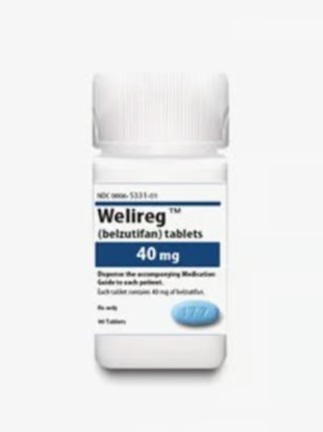
MSD's rare disease drug Welireg (belzutifan) has failed to secure reimbursement in its second attempt.
The Health Insurance Review and Assessment Service (HIRA) announced on Wednesday the results of the second 2025 Cancer Drug Reimbursement Review Committee meeting, which reviewed reimbursement standards for anti-cancer drugs.
Welireg, Ledaga Gel (chlormethine), and Omjjara (momelotinib) were evaluated for new reimbursement. While Ledaga Gel and Omjjara successfully established reimbursement standards, Welireg failed to pass.
Welireg is an oral HIF-2α inhibitor indicated for treating renal cell carcinoma, central nervous system hemangioblastoma, and pancreatic neuroendocrine tumors in adult patients with von Hippel-Lindau (VHL) disease who do not require immediate surgery.
VHL is an inherited disorder associated with tumors developing in multiple organs, caused by genetic abnormalities in the tumor suppressor gene VHL. Patients with VHL can develop up to 10 tumors in different organs over their lifetime, and even with treatment, new tumors are likely to emerge.
Before Welireg’s development, the only treatment option for VHL was regular screening and surgery, requiring most patients to undergo repeated surgeries throughout their lives. This led to decreased quality of life and increased psychological distress.

Welireg remains the only treatment for VHL to date. Last May, an online public petition urging its inclusion in health insurance coverage gathered 50,000 signatures and was referred to the National Assembly’s Health and Welfare Committee, where it remains pending.
MSD Korea first sought reimbursement for Welireg in April 2024 but failed to pass the cancer drug review panel’s meeting in August. The company made a second attempt in December 2024, but the panel again concluded that a reimbursement standard could not be set.
In contrast, Ledaga Gel and Omjjara both passed the cancer drug reimbursement review on their first attempt.
Ledaga Gel is a gel formulation of chlormethine, a cytotoxic DNA alkylating agent that forms cross-links between DNA chains, inhibiting cell proliferation and inducing cell death.
In October 2024, Synex received approval from the Ministry of Food and Drug Safety for Ledaga Gel as a topical treatment for adult patients with early-stage mycosis fungoides cutaneous T-cell lymphoma (MF-Type CTCL) who had previously undergone skin-directed therapy.
CTCL is a primary, superficial, non-epidermal, non-Hodgkin’s lymphoma characterized by malignant T-cell proliferation, primarily in the skin. The most common form, mycosis fungoides (MF), accounts for about 60 percent of cases. Before Ledaga Gel, no topical therapies were licensed in Korea for early-stage MF, with topical corticosteroids serving as the primary treatment.
GSK’s Omjjara is an oral JAK1, JAK2, and ACVR1 inhibitor, approved in September 2024 for treating intermediate- or high-risk myelofibrosis (primary myelofibrosis, myelofibrosis following polycythemia vera, or myelofibrosis following essential thrombocythemia) in adults with anemia.
JAK1, JAK2, and ACVR1 play interrelated roles in myelofibrosis progression. Omjjara inhibits JAK-STAT signaling by blocking JAK1/2 to reduce splenomegaly and disease-related symptoms while also inhibiting ACVR1, which induces a dose-dependent decrease in serum hepcidin and hepcidin mRNA expression, restoring iron homeostasis to alleviate anemia.
Unlike existing JAK inhibitors such as Jakavi (ruxolitinib) and Inrebic (fedratinib), which solely inhibit JAK-STAT signaling, Omjjara also targets ACVR1, providing additional benefits in relieving anemia symptoms.
On the same day, Erleada (apalutamide), Campto (irinotecan), and Enhertu (trastuzumab deruxtecan) were reviewed and approved for insurance coverage.
Erleada received expanded coverage for high-risk non-metastatic castration-resistant prostate cancer (nmCRPC), while irinotecan was recognized as an “off-label” therapy for esophageal cancer. Enhertu’s reimbursement was clarified for “prior therapy” in the treatment of third-line or higher gastric cancer, where it is currently covered.
Related articles
- MSD promotes Vaxneuvance ahead of showdown with Pfizer’s Prevnar20 in Korea’s vaccine market
- Hanmi Pharm, MSD to test immune-activating Keytruda combo in phase 1
- MSD Korea intensifies clinical collaborations to lead oncology innovation
- Delayed coverage for VHL drug threatens rights to life: patient group

